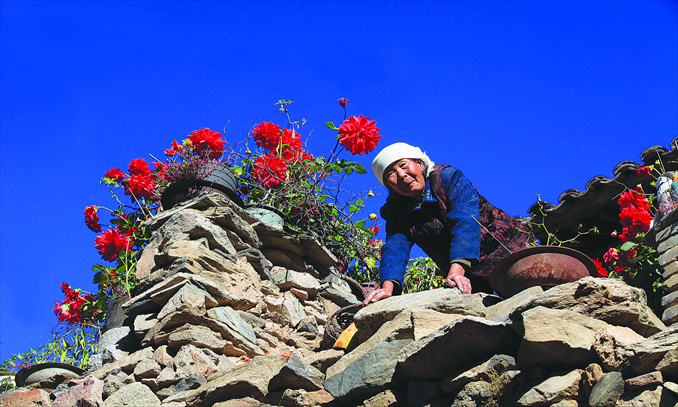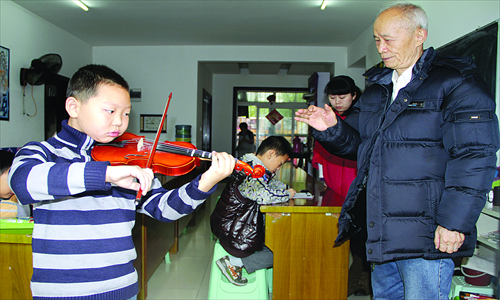Filial piety by decree

On December 28, Ohio University student Aubrey Ireland obtained a restraining order requiring her overbearing parents to stay at least 150 meters away from her. On the same day, China passed a law requiring adult children visit their aged parents "often," or risk repercussions.
"Listen, if you don't come home to visit us, we will sue you," that was the first text message 25-year-old Aimee Yu got when she returned from her New Year holiday in Macao. It was the first holiday that she had ever not spent with her parents.
"My first reaction was 'What? I need to hire a lawyer,'" Yu told the Global Times. Like many only children, she was required by her parents to call or text them every day, and spend all her holidays either at their home in Shandong Province or welcoming them to Beijing.
This New Year, she decided to go to Macao instead. She believed her parents could wait as the Chinese New Year was the following month.
The message she got showed how wrong she was. She sees going home as a "sweet burden" but believes "my parents would never really sue me." The prayers of millions of Chinese kids may be with her.
Odd legal move
The amendment to the Law on the Protection of the Rights and Interests of the Elderly is seen as being in response to the increasing difficulty China is facing in caring for its aging population, yet it does not specify how often such visits should happen or the possible punishments.
By the end of 2010, there were over 167 million people aged over 60, 13.26 percent of the total population. This number is set to reach over 200 million this year. Many young people have left home to find jobs in the bigger cities with almost 50 percent of families now "empty nesters," according to official statistics.
However, critics say visiting parents is not an area the law should be concerned with.
"The amendment doesn't have any practical value in real life," Zhao Liangbo, deputy chief lawyer of the JoinWay Law Firm litigation department, told the Global Times, "Visiting home cannot and should not be required by law. Law enforcement would only make the situation worse."
Many Chinese parents might find it hard to sue their adult children, but loneliness is spreading like a disease among elderly parents. When his son, who lives in the same building, didn't come to visit him, the 83-year-old Wang Shiqiang from Nanjing, Jiangsu Province, went to court and sued his adult children for support payments in 2011.
"Only my eldest daughter comes to see me once in a while. My three other children have never visited me in the past 10 years, even the son who lives in the same building as me never comes," Wang told the Global Times.

In a country where the Confucian virtue of respecting the elderly is highly praised, adult children are said to have a duty to support their parents financially and emotionally.
Wang has been living alone since his wife died in 1995. He said his monthly 1,000 yuan ($161) pension is not enough to hire a carer. Legal service officials contacted his adult children, but they still refused to visit him, saying he was too difficult to be around.
"I know I might not have treated them well when they were little, but I can change now. I only hope they can come and see me more often," he said.
Forcing parental love
Speaking at a press conference in December, legislator Yu Jianwei explained that China considers the amendment a long-term strategic task needed to actively confront the challenges posed by an aging society.
"These clauses carry significance for China in devising and carrying forward a national agenda on the aging population on strategic fronts," Yu was quoted as saying.
Beginning from this year, the ninth day of the ninth lunar month, Double Ninth Festival, will become a day to honor the elderly. Yu said he hopes the law encourages more adults to go home and visit their families, to eventually become a popular trend.
For many elderly parents, the best gift on this day might be a visit from their adult children. But for many adult children who work far away from home, going home is not easy, with time and costs forming two great obstacles.
A survey found that 77 percent of some 10,000 respondents said they visit their parents only once every six months, with 36 percent of migrant workers seeing their folks only once a year, mainly during China's Spring Festival period, Xinhua News Agency reported.
"It's not that I don't want to go home but I really don't have time," Tang Xiaohua, who hails from Guangdong Province but works in Beijing, told the Global Times.
He wants to move his parents to the big city, but he worries they would not fit in there. Even if his parents agreed to live with him, he probably could not afford it, Tang explains.
The law also requires companies to offer employees whose parents live far away up to 20 days' leave, but many companies are likely to ignore this. Furthermore, many employees worry they might lose their jobs if they return home too often.
"I feel bad for being so far away from my parents, but I send money back home every month," he said. "It is a way to show my support and love."
To most elderly people, a visit from their children is worth much more than a pile of cold banknotes though.
In October, an 82-year-old retired government official, named Ma from Shandong Province, sued his three adult children for neglect. "I don't need their money or anything. I just want them to come home and see me," he said.
This was before the amendment of the law and Ma's lawyer Wang Zhiguang told the Global Times that the judge felt troubled about interfering in family affairs. Ma eventually dropped the case.
"It really put the judge in an embarrassing position," Wang said. "If they were to order adult children to visit their parents but they didn't comply, the courts could do nothing about it."
"Nevertheless, it is a big step forward for China's law," he continued, referring to the amendment. "We might see more similar cases from now on."
Different strokes
Two years ago, when China was considering making it a legal duty for people to visit their aged parents, it sparked huge debate whether or not strengthening morality through legislation was right.
Many lawyers and professors criticized the amendment, saying turning Confucian values into law would push society backward.
"Admittedly, the lack of filial respect has become an issue in recent years, but the reason behind it is our education," said Zhao. "We focus too much on how to get ahead instead of being respectful to the elderly."
But despite the protests, it is now official. Many adult children said they do not feel comfortable about being forced to visit their parents.
An aging population is not China's problem alone, it is an issue many countries are grappling with various degrees of success. Criticisms that the government is shirking its social welfare responsibilities may ring out, particularly given recent attention on lacking hospices or retirement homes for China's elderly.
"Visiting elderly parents is not just the responsibility of adult children, but of our entire society," said Ma Guilu, a newspaper commentator in Jiangsu Province. "The government should build more nursing homes and ensure workplaces can implement home leave to make it work."
Qiao Xinsheng, director of the Social Development Research Center of Zhongnan University of Economics and Law, has different opinion.
"It is easy to blame the government as its healthcare system still has much to improve, or the companies for not respecting their employee's rights, yet each person cannot deny their own responsibility in meeting the needs of the elderly," he wrote.
Overall, a consensus seems forming, outside of a few desperate elderly people and legislators, that this is a risky arena for the government to step into. Despite Confucian values of filial piety being well-engrained in Chinese society, legislating these into forced contact between parents and children may be tricky with enforcement set to be highly problematic.
In Singapore, adult children are encouraged to live with their parents. Those families with three generations living under the same roof can get subsidies from the government.
One drastic example has been provided by Germany, which has seen insurance companies arrange for hundreds, if not thousands, of its old people to be expatriated to retirement homes either in neighboring countries such as Hungary and Slovakia, or further away, in Thailand or the Philippines.
While the initial public reaction was one of fury, German MP Willi Zylajew told the Guardian that "considering the imminent crisis, it would be judicious to at least start thinking about alternative forms of care for the elderly."
Beyond the methods mentioned above, one Chinese old man took truly drastic measures - getting himself put in prison to be taken care of.
Fu Daxin, 73, a farmer from Hunan Province, afraid he was getting too old to make a living, reportedly planned a robbery in a Beijing railway station to get himself into jail in 2008. His plan was successful since he was sentenced to two years in a jail where people aged over 60 do not have to do manual labor.
In the first three months of his term, he put on five kilograms. "They offer you food, they care for you when you get sick and there is no manual labor. This is a very good life," he explained.